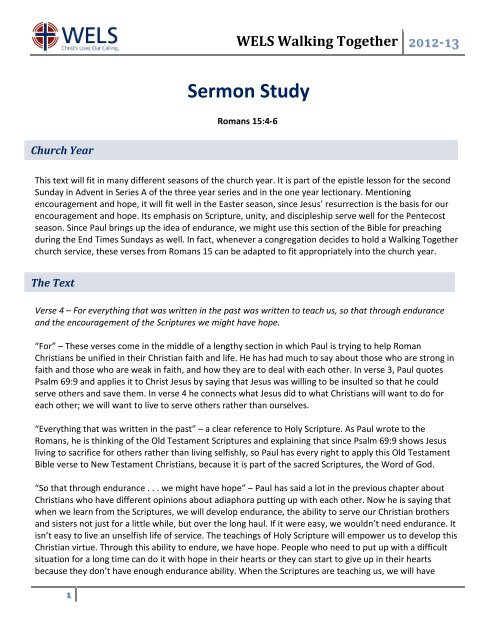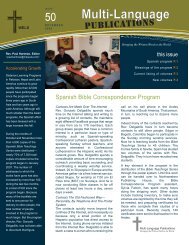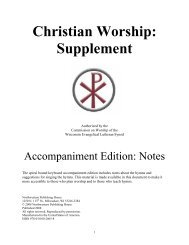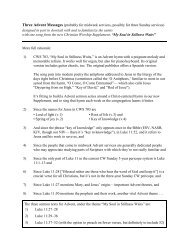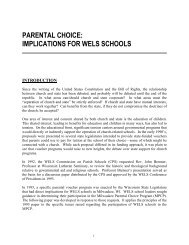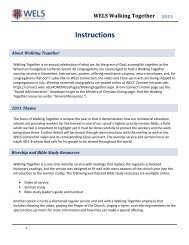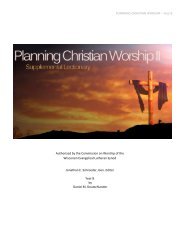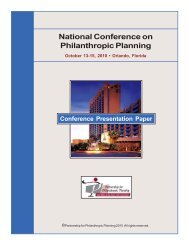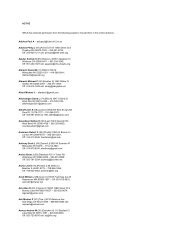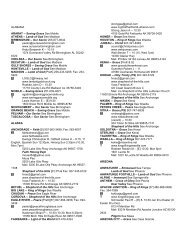Sermon Study.pdf - Connect
Sermon Study.pdf - Connect
Sermon Study.pdf - Connect
Create successful ePaper yourself
Turn your PDF publications into a flip-book with our unique Google optimized e-Paper software.
Church Year<br />
<br />
WELS Walking Together<br />
<strong>Sermon</strong> <strong>Study</strong><br />
Romans 15:4-6<br />
-<br />
This text will fit in many different seasons of the church year. It is part of the epistle lesson for the second<br />
Sunday in Advent in Series A of the three year series and in the one year lectionary. Mentioning<br />
encouragement and hope, it will fit well in the Easter season, since Jesus’ resurrection is the basis for our<br />
encouragement and hope. Its emphasis on Scripture, unity, and discipleship serve well for the Pentecost<br />
season. Since Paul brings up the idea of endurance, we might use this section of the Bible for preaching<br />
during the End Times Sundays as well. In fact, whenever a congregation decides to hold a Walking Together<br />
church service, these verses from Romans 15 can be adapted to fit appropriately into the church year.<br />
The Text<br />
Verse 4 – For everything that was written in the past was written to teach us, so that through endurance<br />
and the encouragement of the Scriptures we might have hope.<br />
“For” – These verses come in the middle of a lengthy section in which Paul is trying to help Roman<br />
Christians be unified in their Christian faith and life. He has had much to say about those who are strong in<br />
faith and those who are weak in faith, and how they are to deal with each other. In verse 3, Paul quotes<br />
Psalm 69:9 and applies it to Christ Jesus by saying that Jesus was willing to be insulted so that he could<br />
serve others and save them. In verse 4 he connects what Jesus did to what Christians will want to do for<br />
each other; we will want to live to serve others rather than ourselves.<br />
“Everything that was written in the past” – a clear reference to Holy Scripture. As Paul wrote to the<br />
Romans, he is thinking of the Old Testament Scriptures and explaining that since Psalm 69:9 shows Jesus<br />
living to sacrifice for others rather than living selfishly, so Paul has every right to apply this Old Testament<br />
Bible verse to New Testament Christians, because it is part of the sacred Scriptures, the Word of God.<br />
“So that through endurance . . . we might have hope” – Paul has said a lot in the previous chapter about<br />
Christians who have different opinions about adiaphora putting up with each other. Now he is saying that<br />
when we learn from the Scriptures, we will develop endurance, the ability to serve our Christian brothers<br />
and sisters not just for a little while, but over the long haul. If it were easy, we wouldn’t need endurance. It<br />
isn’t easy to live an unselfish life of service. The teachings of Holy Scripture will empower us to develop this<br />
Christian virtue. Through this ability to endure, we have hope. People who need to put up with a difficult<br />
situation for a long time can do it with hope in their hearts or they can start to give up in their hearts<br />
because they don’t have enough endurance ability. When the Scriptures are teaching us, we will have
WELS Walking Together<br />
-<br />
enough ability to endure and our hope will continue. We know that we won’t have to endure it forever, and<br />
that easier and lighter days are ahead.<br />
“So that through . . . the encouragement of the Scriptures we might have hope” – One of the reasons God<br />
has given us his written Word is so that we will always have the encouragement we need to keep doing<br />
what we need to do in life. The Scriptures are a powerful and positive force in life, continually calling us to<br />
the Lord’s side for comfort and strength to go on. Because the teaching of Scripture keeps filling up our<br />
hearts with the Lord’s encouragement, our endurance through difficult situations is much more than just<br />
gritting our teeth and getting through to the other side with jaws clenched. Even in the middle of<br />
difficulties, we can actually look forward to more opportunities for unselfish service and sacrifice, and we<br />
continue to have a sure hope that there will be a good outcome and result of every challenge that we need<br />
to endure. There is nothing more encouraging than the promises of our Lord God in the Scriptures, and<br />
when they keep teaching us, our hope only becomes firmer and stronger.<br />
Verse 5 – May the God who gives endurance and encouragement give you a spirit of unity among yourselves<br />
as you follow Christ Jesus,<br />
“The God who gives endurance and encouragement” – It is very clear from verses 4 and 5 that God himself<br />
works through the teaching of the Scriptures. When the Scriptures teach us, we receive the ability to<br />
endure and to be encouraged in our Christian life (v. 4). These abilities come from God himself (v. 5). Our<br />
translation interprets the genitives as genitives of source (God is the source of endurance and<br />
encouragement and gives them out to his people). Another possibility would be that they are descriptive<br />
genitives (God is characterized by endurance and encouragement, and he is always enduring and<br />
encouraging). Both interpretations fit the context well, and they are not very far apart from each other.<br />
“A spirit of unity among yourselves” – This literally means, “to think the same thing in each other.” Even<br />
when some are strong in the Christian faith and others are weak, even when Christians have different<br />
points of view about adiaphora, even then the Lord God can give a spirit of unity to a group of Christians<br />
and help them to think the same way. This spirit of unity happens when a group of Christians has the same<br />
attitude as Christ Jesus (Philippians 2:5), when we “stand firm in one spirit, contending as one man for the<br />
faith of the gospel without being frightened in any way by those who oppose [us]” (Philippians 1:27-28). As<br />
Christians constantly learn from the Scriptures, as endurance and encouragement and hope grow in<br />
Christians, the Lord also grows a unified spirit in Christian groups.<br />
“As you follow Christ Jesus” – The Greek prepositional phrase is showing similarity and uniformity; literally<br />
it says, “in accordance with Christ Jesus.” Paul is asking the Lord God to give not just any kind of unity, not a<br />
unity based on a false hope or a false standard, but a unity that agrees with Christ Jesus and everything he<br />
says and stands for. A unity in agreement with Christ Jesus is a rock solid unity, and differences in the<br />
strength of faith that people have and in convictions about adiaphora cannot shake or damage such a unity.
WELS Walking Together<br />
-<br />
Verse 6 – So that with one heart and mouth you may glorify the God and Father of our Lord Jesus Christ.<br />
“With one heart and mouth” – When God helps people to think the same way, the way Christ Jesus thinks,<br />
then the purposes of their hearts and the words of their mouths will be the same. They will be a body of<br />
believers without factions or divisions, and their unity will be apparent to all. This verse shows just how<br />
close the bond of unity can be among Christians, even when there are differences in the strength of faith<br />
among them, even when they think differently about adiaphora.<br />
“You may glorify the God and Father of our Lord Jesus Christ” – When Christians receive from God this spirit<br />
of unity, when they think together and with Jesus, then they will surely give glory to God the Father. In his<br />
high priestly prayer, Jesus said that he received glory from his Father and gave it to his disciples so that they<br />
would be one (John 17:22). This verse brings us full circle. The reason Jesus shares God’s glory with us and<br />
unifies his Church on earth is so that we will glorify God the Father. What an amazing privilege we have to<br />
praise and glorify the God and Father of our Lord Jesus Christ!<br />
Homiletical Suggestions<br />
We give glory to God by our unified efforts to train full-time servants of the Lord and then to send them out<br />
with the Scriptures to strengthen our unity and to offer the gospel to more and more people. It may be<br />
beneficial to imagine the results if our synod’s goals for 2017 can be reached. If possible we will be offering<br />
the gospel in 30 different countries (in 2010 we were in 23 countries) and will serve 150,000 souls worldwide<br />
(107,000 in 2010). If possible we will be opening 10 new home missions each year in 2017 (4 were<br />
opened in 2010). If these goals are reached, there will be an increasing need for called workers, and our<br />
goals can be reached if congregation mission offerings grow to $27.5 million a year ($20.9 million in 2010).<br />
In order to reach goals like these, there will be challenges to endure, and we will need the endurance and<br />
the encouragement of the Scriptures to keep moving forward toward our goals. Looking forward in this<br />
way, we offer the following outlines:<br />
Option A<br />
We can emphasize the wonderful blessing of unity that the Lord has showered on our synod and encourage<br />
each other to keep working to strengthen this unity.<br />
A Spirit of Unity in Christ Alone – I. Strengthened by Scripture’s Blessings, II. Intended to Glorify God<br />
Option B<br />
We can emphasize the end result of all our efforts to walk together in Christ alone – bringing glory and<br />
praise to our God who has saved us.<br />
Glorify God Together – I. Blessed by the Scriptures, II. Unified in Christ Alone


